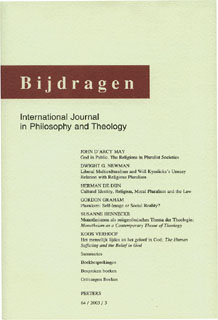 previous article in this issue previous article in this issue | next article in this issue  |

|
Document Details : Title: In vrijheid voorzien - Augustine on Prescience and Free Will Subtitle: Een systematisch-theologische analyse van Augustinus' teksten over voorkennis en wilsvrijheid Author(s): DEN BOK, Nico Journal: Bijdragen Volume: 56 Issue: 1 Date: 1995 Pages: 40-60 DOI: 10.2143/BIJ.56.1.2002464 Abstract : Augustine's analysis and solution of the classical problem of free will and foreknowledge - as given in De libero arbitrio III 4-10 and De civitate Dei V 8-10 - stand out in their brevity and simplicity. His texts carry formulations which show an astonishing clarity not only in what they explicitly say, but also in what is implicitly said in them. Most recent discussions of Augustine's view, however, are unclear about this clarity, at least partly because they tend to a deterministic position; they probably sense, unwillingly, that Augustine intends to rule that position out. In the discussions on the problem a dilemma seems to be unavoidable; one can only cling to one of its horns. Either God knows the future and then human volitions cannot be free (the deterministic position), or the human will is free but then God cannot know its future volitions (Cicero's position). In his analysis of this dilemma Augustine shows that both positions already presuppose an insight which cannot be taken for granted. The certainty of God's foreknowledge seems to entail that the object of his foreknowledge is necessary, but on close examination it does not. For it is sufficient to state: It is necessary that, if there is an object of God's foreknowledge, God knows it. Augustine's central sentences carefully formulate this kind of - implicative - necessity involved in prescience. Because of this 'necessity', he can consistently maintain that it is on the power of the will to sin or not to sin and yet, if a man will sin, God will know it, or if that man will not sin, God will know that. Thus the object of God's knowledge can be contingent, as in the case of future volitions, and still His foreknowledge can be certain. A deterministic interpretation of Augustine's analysis can be substantiated by the idea that God foreknows what the will itself will do, whereas his certainty is based on the supposition that the will is a natural cause of its volitions - just like the other causes in the cosmos. Although Augustine does not deal with this more specific aspect - he does not need to, because he showed that the certainty of God's knowledge can be guaranteed independent of the (modal) status of its object - we can conclude from his formulations that the will, as a cause of (future) volitions, differs from a natural cause not only by producing them itself, but also by producing them in such a way that it can not-produce them. |
